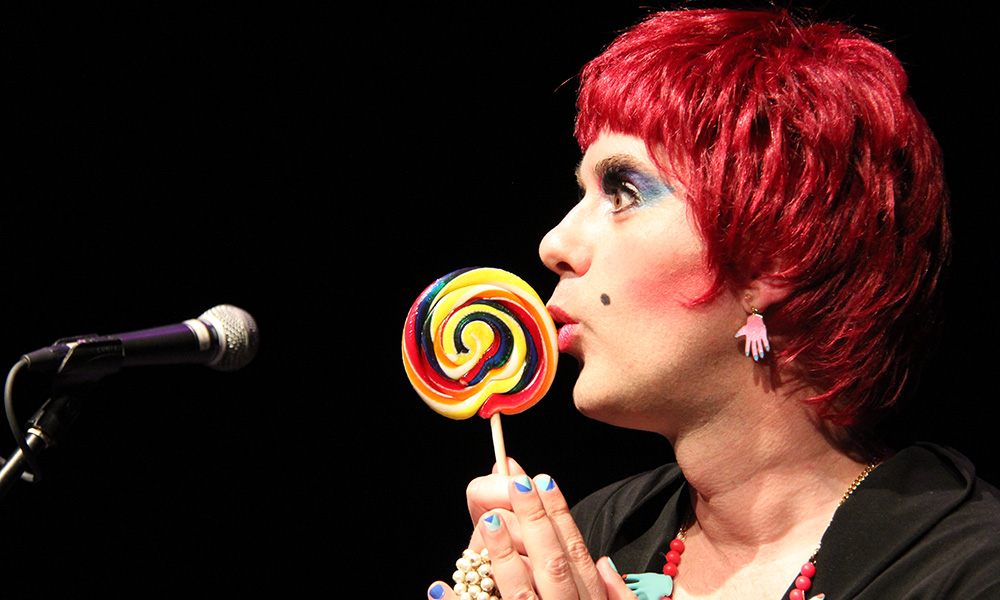
Miss Cookie LaWhore, the alter-ego of UBC Okanagan Professor Michael V. Smith, is one of several entertainers lined up for Pony Cabaret, a fundraising event taking place on February 9. Tickets are on sale now.

Miss Cookie LaWhore, the alter-ego of UBC Okanagan Professor Michael V. Smith, is one of several entertainers lined up for Pony Cabaret, a fundraising event taking place on February 9. Tickets are on sale now.
Posted in Uncategorized
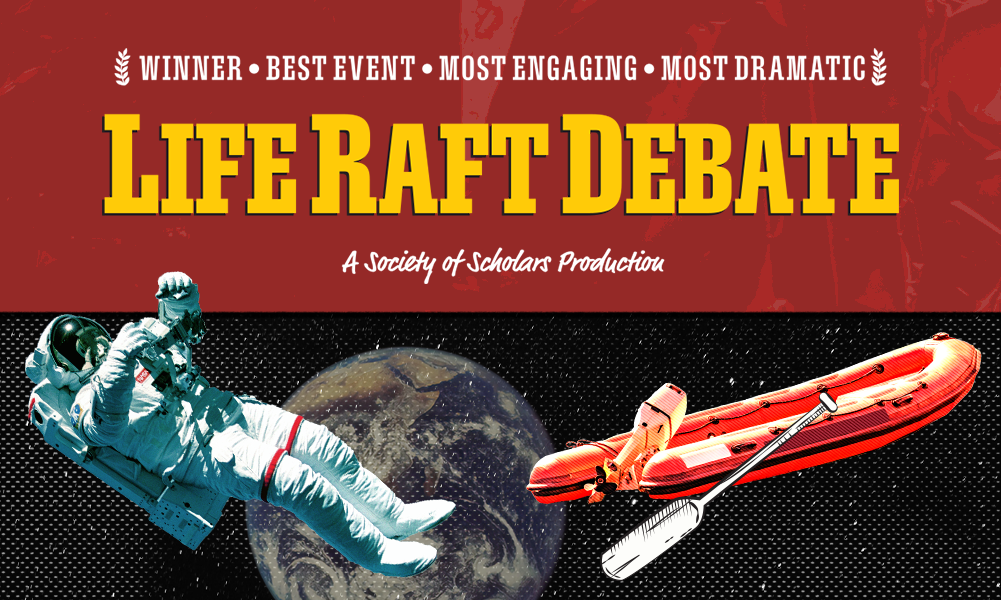
What: Fifth annual Life Raft Debate
Who: UBC professors compete to win a role to lead society
When: Wednesday, January 25, beginning at 7 pm
Venue: COM 201, Commons building, 3297 University Way and over Zoom
As the Okanagan winter progresses some people might dream of being cast away on a deserted beach.
But a few UBC Okanagan professors have now landed on a fictional island and have their work cut out for them.
Each year UBC Okanagan’s Society of Scholars hosts a Life Raft Debate, pitting faculty against each other as they maintain why they alone have the skills to help save the world and therefore deserve the last seat on the life-raft.
The premise for the fifth annual Life Raft Debate involves faculty who have crash-landed on a fictional tropical deserted island, explains Society of Scholars spokesperson Aimee Davarani. Recognizing the necessity for governance in their new home, the survivors must hold an election to determine who will become their leader and last hope for a civilized society.
“This is their chance to campaign as the new leader of the island,” she says. “With all the resources provided to stay alive, the chosen one must take on the challenge of forming a new culture that can be sustained for the future. Because who knows when help will arrive? But first, they must win the debate.”
“The members of the audience are the ones who will vote for their new leader, making this an entertaining and interactive evening,” Davarani adds, a third-year psychology student.
This year the debating professors include Dr. Jordan Stouck from the Faculty of Creative and Critical Studies, School of Engineering’s Dr. Alon Eisenstein and Dr. Renaud-Phillippe Garner from the Irving K. Barber Faculty of Arts and Social Sciences.
“We invite people to come and watch the professors from different faculties debate against each other to prove that their discipline is superior to all others when it comes to creating and maintaining a new society,” adds Davarani.
To add intrigue to the evening, the final debater, Dr. Matthew Nelson, will play the role of Devil’s Advocate. The biology professor will campaign that none of the academic debaters deserve to be in a leadership role and the fate of society should rest with the audience as a whole.
“We really encourage our community to come watch our faculty members as they deal with this unique twist on defending their expertise,” says Davarani. “The annual Life Raft Debate has become a fun and entertaining way to help people discover how different points of view and areas of expertise can work together, or against, improving our society.”
More information and registration can be found at: students.ok.ubc.ca/life-raft
The post Life Raft Debate pits professors against each other for survival appeared first on UBC Okanagan News.
Posted in Uncategorized
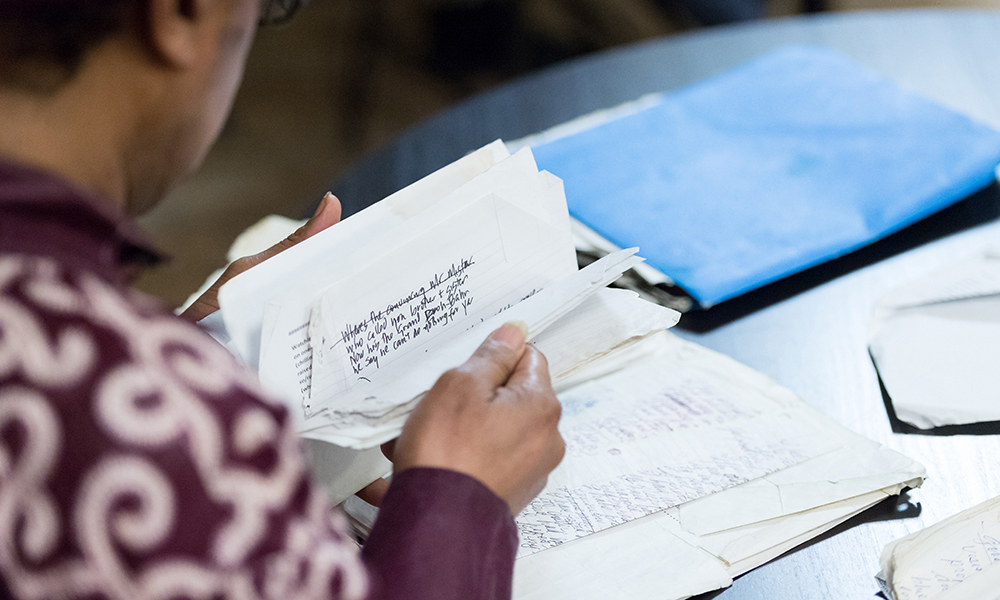
Entries are open for UBCO’s annual Okanagan Short Story Contest
While December is the time many people look forward to carrying on favourite traditions, the creative writing faculty at UBC Okanagan is encouraging local writers to begin a new one.
UBCO’s Okanagan Short Story Contest was initiated 25 years ago by Nancy Holmes and John Lent. Holmes, Associate Professor of Creative Writing, says if budding writers haven’t yet participated in the annual contest, maybe this is the year they should.
“When we launched the contest, we had no idea it would just get bigger and better two and a half decades on,” says Professor Holmes, who teaches in the Faculty of Creative and Critical Studies. “Each year the stories that win are amazing. I’m hoping for 25 more years and many more wonderful stories.”
The short story contest has a long tradition of introducing budding writers to the Okanagan community. Winners in previous years have gone on to publish with Penguin Random House, Arsenal Pulp Press and NeWest Press, as well as numerous national and international magazines and journals.
Local emerging writers are invited to submit their work for the chance to win great prizes, including a top award of $1,000 and a one-week retreat at The Woodhaven Eco Culture Centre in Kelowna. Second and third prizes are $400 and $200, respectively. This is the fourth consecutive year the contest has been open to high school students and the top prize for that category is $200.
Entries are open to fiction writers in the Southern Interior of British Columbia—east of Hope, west of the Alberta border, north of the border to the United States and south of Williams Lake.
All original entries must be between 1,000 and 4,000 words, and writers are welcome to submit as many entries as they choose. There is a $20 entry fee for each story (but no charge for students in the high school category). All proceeds will go towards the FCCS Creative Writing scholarships at UBC Okanagan, and towards supporting Indspire, an Indigenous organization that invests in the education of First Nations, Inuit and Métis people.
“I really do hope people, who might have some time during the upcoming holiday season, try their hand at creative writing and test the waters by submitting an entry to the short story contest,” says Holmes. “Who knows, this might become an annual tradition for them.”
Entries must be received by 11:59 pm February 6, 2023.
Submitted entries will be adjudicated by celebrated Canadian fiction writer Corinna Chong and faculty from the Creative Writing Program. Chong won the 2021 CBC Short Story Prize for her work Kids in Kindergarten. Her first novel, Belinda’s Rings, was published in 2013 and her short fiction has been published in magazines across Canada, including The Malahat Review, Room, Grain and The Humber Literary Review. Chong currently lives in Kelowna and teaches English and Fine Arts at Okanagan College.
Winners of the short story contest will be announced in March at a public event where the finalists will be invited to read from their work. For a full list of contest details and rules, visit: fccs.ok.ubc.ca/short-story
The post Submissions open for UBCO’s annual Okanagan Short Story Contest appeared first on UBC Okanagan News.
Posted in Uncategorized
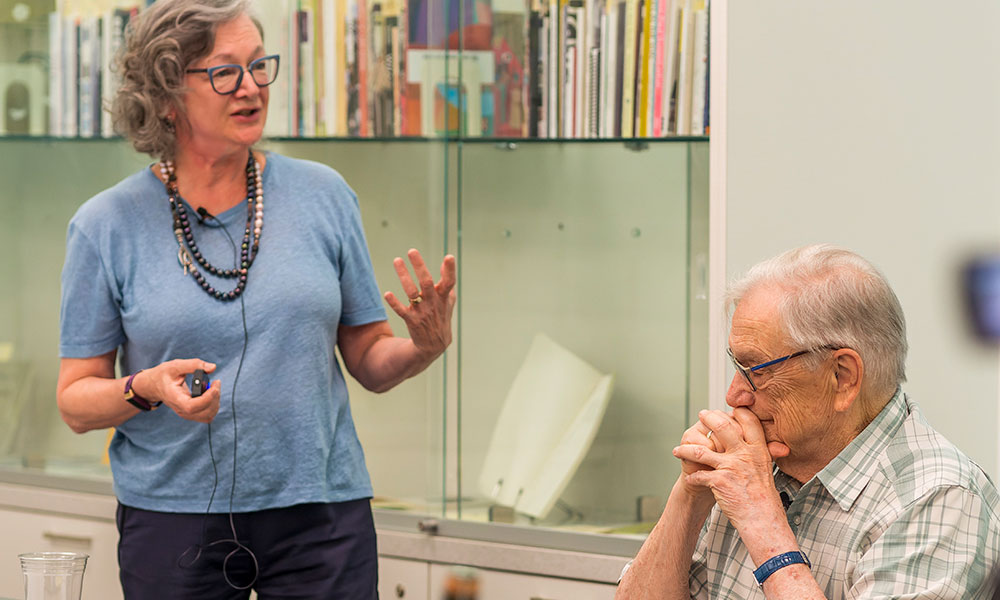
Canadian writer George Bowering listens while his wife Jean Baird talks about the contribution of his writings and recordings to UBCO’s special collections library and digital humanities lab.
Posted in Uncategorized
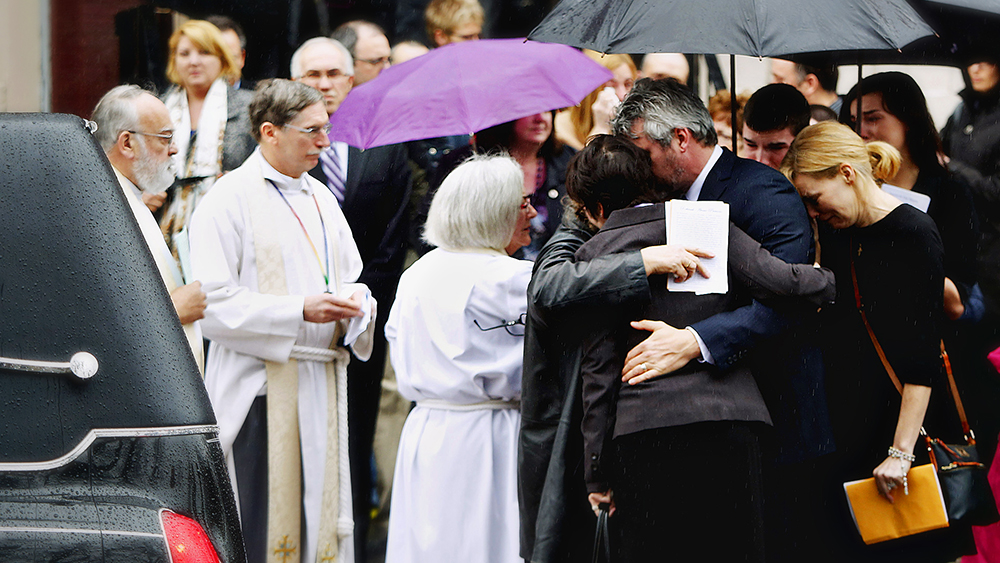
Moving moments, such as the family of Rehtaeh Parsons gathered at her funeral, will be shown during the screening of Backlash, Misogyny in the Digital Age at UBCO Tuesday, December 6.
What: Documentary Film Screening: Backlash, Misogyny in the Digital Age
When: Tuesday, December 6, 6:30 pm
Where: University Theatre, ADM 026, 1138 Alumni Avenue, UBC Okanagan
For the National Day of Remembrance and Action on Violence Against Women, Espaces francophones UBCO, in association with Réseau Femmes and Inform’elles Colombie-Britannique, is presenting a film screening of the Canadian documentary, Backlash, Misogyny in the Digital Age. This screening will be presented in French with English subtitles.
The documentary is a shocking story of four female leaders whose lives are overturned by cyberviolence, says Dr. Francis Langevin, Associate Professor of Teaching in the department of languages and world literatures.
“Backlash, Misogyny in the Digital Age has had an important impact in Québec, where it was produced,” says Dr. Langevin. “Espaces francophones UBCO really wanted to make it available in the Okanagan, and especially for our campus community.”
Dr. Langevin is co-director for Espaces francophones which aims to offer French-language cultural and social activities to students in the French-speaking minority community of UBCO with the goal of highlighting and facilitating spaces for Francophone socialization.
This documentary film examines technology-facilitated violence directed at women and the types of backlash that women experience for participating in public life more broadly.
“The documentary exposes what is not often discussed in the public arena—and it definitely calls for action,” says Dr. Langevin. “It’s important to have a wide reach and a public screening in order to display solidarity with survivors of gendered violence, and to also make visible the resources that are available in our community, especially on the National Day of Remembrance and Action on Violence Against Women.”
This film includes images as well as written and spoken content that touches on topics that viewers might find distressing, explains Johannah Black, Education and Prevention Specialist from UBCO’s Sexual Violence Prevention and Response Office (SVPRO).
These include technology-facilitated violence and harassment, stalking, sexual violence, threats of death and sexual assault, bullying, suicide, hate speech including racial and misogynist slurs, right-wing extremist violence, slut shaming language, sharing sexual images and videos online without consent, and realistic looking but photoshopped images of both physical and sexual assault.
“These examples can be shocking and disturbing for viewers, particularly those who have their own experiences with technology-facilitated violence or sexual violence,” she adds. “For anyone who needs support during or following the screening there will be support staff from SVPRO on hand.”
After the screening, guests are invited to attend a question and answer period with Co-Director Guylaine Maroist, facilitated by Blanche Monabeka. This session will be held in French.
This event is free and open to all, but registration is required. To register for this screening and for a more detailed content description, please visit: backlashUBCO.eventbrite.com
This event is organized by Espaces francophones, with support from the Programme de français and a number of UBCO faculties and schools along with the Sexual Violence Prevention and Response Office , and the UBC Okanagan Equity and Inclusion Office.
The post Documentary Film Screening: Backlash, Misogyny in the Digital Age appeared first on UBC Okanagan News.
Posted in Uncategorized
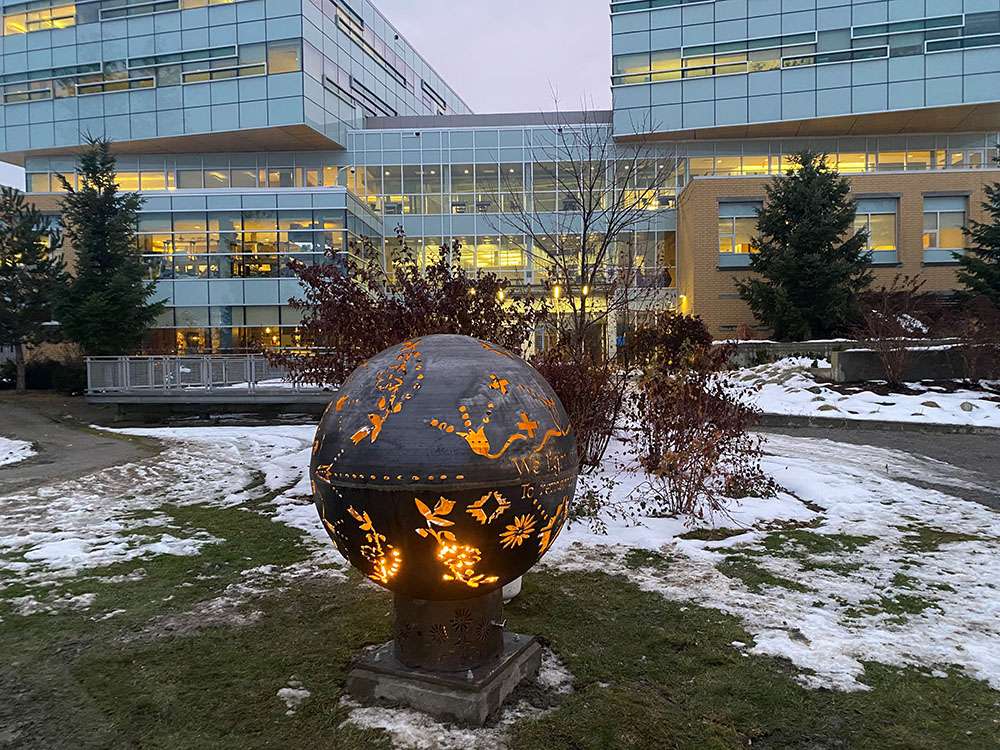
An artistic fire bowl titled For Future Matriarchs was installed at UBCO last week. It will be lit each December 6 in memory of the 14 women killed in the École Polytechnique massacre. The piece was created by internationally recognized Syilx artist Krista-Belle Stewart and Secwépemc artist Tania Willard.
What: 14 Not Forgotten memorial ceremony
Who: UBCO students, faculty, staff, members of the public
When: Tuesday, December 6, 3:30 to 5 pm
Where: Outdoor EME amphitheatre, 1138 Alumni Avenue, UBC Okanagan
UBC Okanagan’s School of Engineering is hosting its annual 14 Not Forgotten memorial ceremony on December 6 to remember the 14 women whose lives were lost in the École Polytechnique massacre.
“The ceremony is held each December not only as a way to remember the young victims but to also commit to action to end violence against women,” says School of Engineering Director Dr. Will Hughes.
On December 6, 1989, an armed man walked into an engineering class at l’École Polytechnique de Montréal. After forcing the men to leave, the gunman began shooting—killing 14 women and injuring ten more.
In response to this tragedy, Canada established December 6 as the National Day of Remembrance and Action on Violence against Women. This day serves as a reminder of the gender-based violence against women in Canada and around the world that persists today.
UBCO’s 14 Not Forgotten Memorial commemorates the École Polytechnique tragedy and also honours the lives and legacies of missing and murdered Indigenous women and girls, including LGBTQ and Two Spirit people.
This year as part of the ceremony, a new art installation will be unveiled as a permanent memorial outside the Engineering Management and Education (EME) building.
“The memorial will serve as a visible symbol of the School of Engineering and UBC’s commitment to diversity, equity and inclusion,” adds Dr. Hughes. This artwork accommodates a fire that will be lit during the annual 14 Not Forgotten ceremony, adding a highly impactful performative aspect to the installation.
The piece, titled For Future Matriarchs was created by an internationally recognized Syilx artist Krista-Belle Stewart and Secwépemc artist Tania Willard, who is an Assistant Professor of Visual Arts in the Creative Studies department.
This fire bowl uses symbolic design elements including the blue flag iris which is the floral emblem of Quebec, traditional plants for Syilx people and Interior Salish basketry aesthetics. The piece was funded by the School of Engineering and will become part of the UBC Okanagan Public Art Collection.
The ceremony will take place on Tuesday, December 6 from 3:30 to 5 pm at the outdoor amphitheatre behind the EME building. A self-guided memorial will be inside and there will be space for reflection and refreshments after the ceremony.
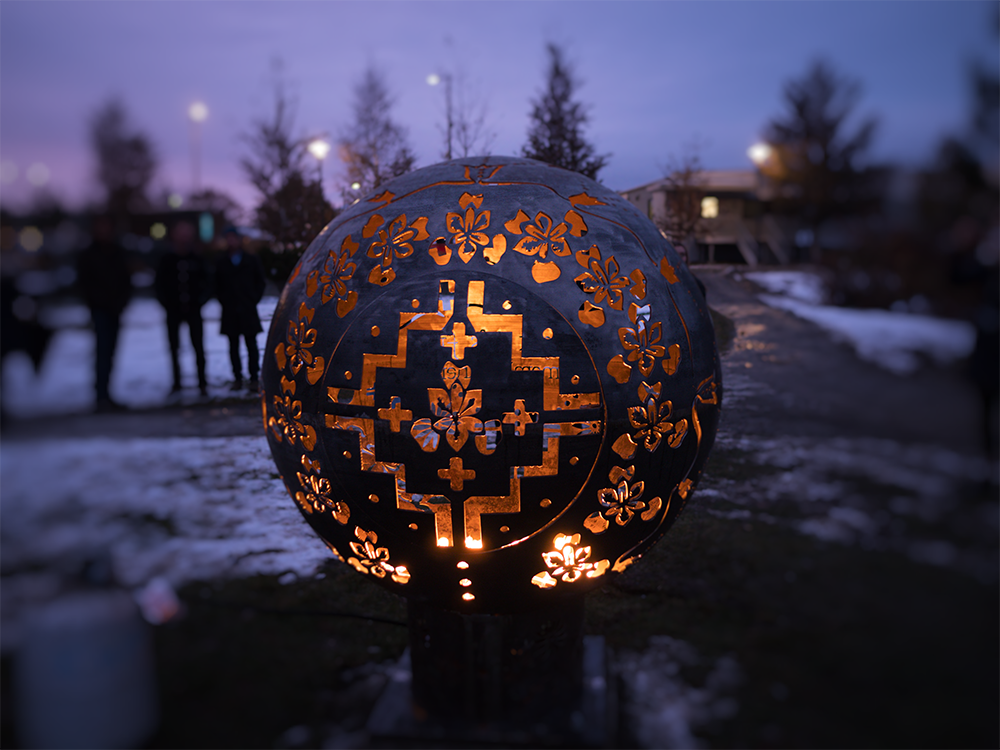
The firebowl was funded by the School of Engineering and will become part of the UBC Okanagan Public Art Collection. Photo by Nasim Pirhadi.
The post 14 Not Forgotten memorial ceremony appeared first on UBC Okanagan News.
Posted in Uncategorized
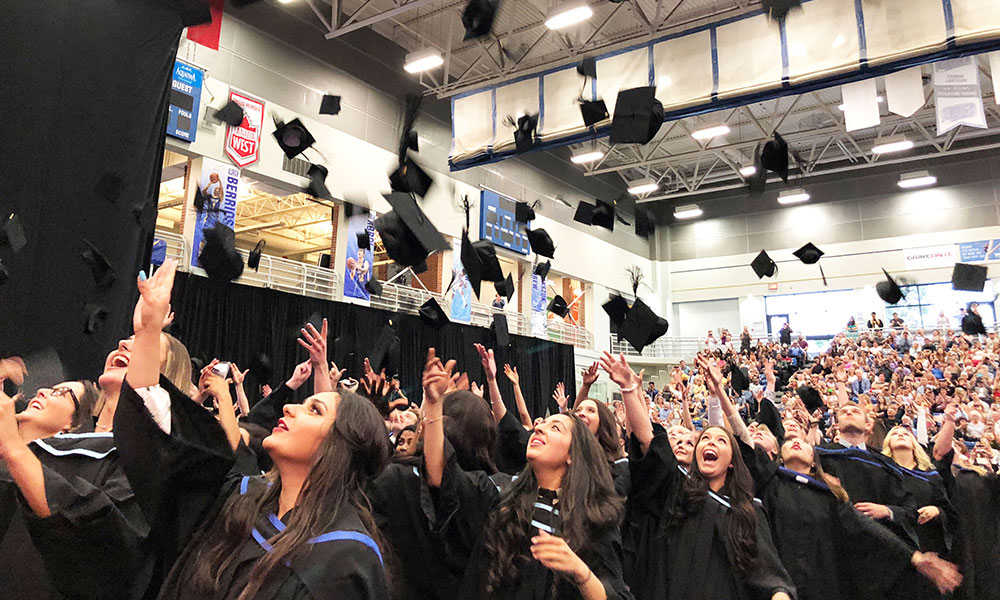
UBCO is hosting a unique fall graduation ceremony Thursday. Students who graduated in 2020 and 2021 will now have the opportunity to toss their caps in celebration like these students did in 2018.
They’re baaack!
This week UBC Okanagan’s campus will be filled with students, now alumni, who graduated and were celebrated with a virtual ceremony during the first two years of the COVID-19 pandemic.
More than 600 are returning to campus to take part in a special ceremony on November 10. The event will recognize the accomplishments of those who didn’t have the chance to experience that iconic opportunity of crossing the stage to receive their degree at a live graduation.
This will be the first time UBC Okanagan has hosted a fall graduation ceremony and it’s a special event for those who graduated in 2020 and 2021, says UBCO Principal and Deputy Vice-Chancellor Dr. Lesley Cormack. Those graduates were surveyed and many indicated they were interested in coming back to campus for a make-up graduation ceremony.
“These are students who completed their studies during a particularly difficult and disconnected time,” Dr. Cormack says. “While UBC honoured our graduates during the height of the pandemic with virtual ceremonies, nothing can compare to the distinction of an in-person event, complete with student speakers and a gym full of proud family members.”
Each ceremony will be complete with speeches from students and special moments to recognize people who received honorary degrees during the pandemic.
Evangeline Saclamacis, who graduated with an applied sciences degree in 2021, is currently working with an international renewable power generation business in Vancouver. She says there are a lot of emotions flowing as she looks forward to returning to UBCO for the ceremony and connecting with former classmates.
“I’m excited to see how the campus has changed since I was last there, and also inspired to see how much I have changed since I first started as a student in 2016,” she says. “UBCO was a place that not only allowed me to grow as an individual, but also allowed me to connect with people with similar aspirations and goals. I’m really excited to return and walk the stage, closing the chapter on my bachelor’s degree.”
Aneesha Thouli, who graduated from UBC Okanagan’s Health and Exercise Sciences program in 2020, is now back at school and is currently a third-year medical student in the Southern Medical Program based at UBCO.
“While this ceremony will look different than any of us expected, I’m grateful we have the chance finally to celebrate,” she says. “I think having been alumni for a few years gives us a unique perspective on the ceremony overall and gives us an opportunity to celebrate our successes in a totally different way than previous classes.”
Three ceremonies will take place on November 10, the first starting at 8:30 am with School of Engineering graduates. Following that, graduates in the School of Education, Faculty of Management and Irving K. Barber Faculty of Science will cross the stage. The final ceremony takes place at 1:30 pm where graduates in the Irving K. Barber Faculty of Arts and Social Sciences, Faculty of Health and Social Development and the Faculty of Creative and Critical studies will be celebrated.
Rain Inaba graduated with an undergraduate degree in microbiology and remained at UBCO to begin his master’s in biochemistry and molecular biology. Inaba is excited to reconnect with the many friends he made while living in residences and says Thursday’s ceremony will allow his fellow graduates to relive past moments and finally celebrate with their families, friends and faculty members.
“With these ceremonies, alumni from all faculties are welcomed back to the campus we all called home for many years,” he says. “This is a day of deserved festivities and a moment of recognition for our graduates. Let us make the ceremonies loud and memorable for each of our classmates as they cross the stage.”
As they have already technically been conferred as UBCO graduates and are officially UBC alumni, these ceremonies will be slightly different from spring convocation. However, Dr. Cormack says every student, especially those who persevered with their studies online, should enjoy the moments of being celebrated at their own graduation ceremony.
“While different, these ceremonies will include many of the traditions of graduation to honour the profound achievements and celebrate the resiliency of these students,” Dr. Cormack says. “We’re proud to have these incredibly engaged alumni who are going out of their way to come back for their graduation. I’m looking forward to congratulating each and every one of them in person.”
The post UBCO hosts three graduation ceremonies for pandemic graduates appeared first on UBC Okanagan News.
Posted in Uncategorized
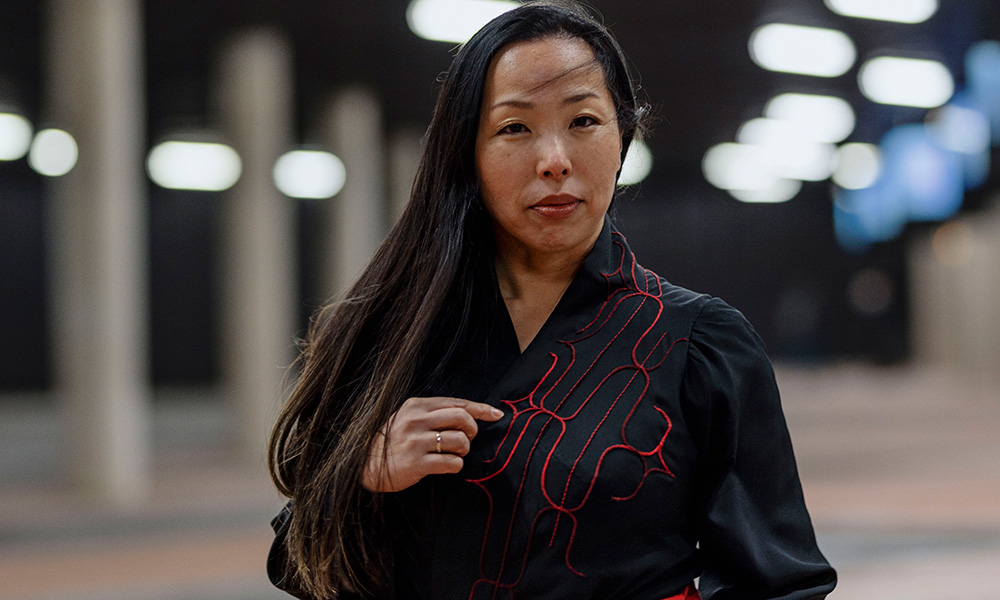
Dr. Kanako Uzawa, Ainu Indigenous artist, musician and scholar, performs a solo show that highlights the unique Ainu culture.
What: Reframing Ainu Indigeneity: Performing exhibit presents traditional and contemporary Ainu dance and music
Who: Dr. Kanako Uzawa, Ainu Indigenous artist, musician and scholar
When: Sunday, July 31, at 7 pm
Where: Ringo-En Orchards, 6831 Bella Vista Road, Vernon
An Indigenous Japanese scholar and musician will be the star of a solo performance that will share the music and dance of Japan’s Ainu people.
Presented by UBC Okanagan’s Faculty of Creative and Critical Studies and the Department of Languages and World Literatures, visiting artist Dr. Kanako Uzawa will present a performance highlighting the unique culture of the Ainu—Japan’s Indigenous people.
Dr. Uzawa, a scholar, advocate and artist will perform an Ainu dance, demonstrate the mukkuri—a traditional Ainu mouth harp—and informally share Ainu culture and contemporary issues of the Indigenous people of Japan at a special presentation on Sunday, July 31.
Nina Langton, Associate Professor of Japanese Studies, Languages and World Literatures at UBC Okanagan, says Dr. Uzawa collaborates and engages with a number of academic and international forums, lectures and artistic work related to Indigenous identity-making.
“Dr. Uzawa’s work on traditional and contemporary Ainu culture has informed my efforts to Indigenize my Japanese language classroom,” says Langton. “She is a well-recognized scholar and artist. We are very fortunate to be able to bring her to the Okanagan.”
Dr. Uzawa is particularly active in promoting contemporary aspects of Indigenous livelihoods using her website AinuToday.com as a means of communication with an international audience.
Her current work is a curational project on the Ainu, in collaboration with the University of Michigan Museum of Art in the United States. She has also worked on an Ainu exhibition One Soul in All: Encounters with Ainu from the North of Japan at the Rautenstrauch-Joest Museum in Cologne, Germany.
In addition to her academic and curatorial work, Dr. Uzawa performs traditional and contemporary Ainu dance and is hosting a performance at UBC Vancouver’s Museum of Anthropology, presented by the Centre for Japanese Studies. Earlier this month, she attended the Banff Centre for Arts and Creativity Intercultural Indigenous Choreographers Creation Lab.
The public is invited to a performance on July 31 at Ringo-En Orchards in Vernon. The outdoor venue opens at 6 pm and people are welcome to bring a picnic, lawn chair or blanket. The performance begins at 7 pm.
This event is free and open to the public, no registration is required.
Dr. Uzawa is an affiliated researcher at the Research Faculty of Media and Communication at Hokkaido University in Japan. She contributes to collaborative research and Ainu performing art on the multifaceted articulations of Indigenous knowledge. Her master’s thesis focused on a comparative study between the Sámi in Norway and the Ainu Indigenous people in Japan. Her PhD focused on urban Ainu livelihood and its contemporary expressions.
The post UBCO hosts evening with traditional and contemporary Ainu performer appeared first on UBC Okanagan News.
Posted in Uncategorized
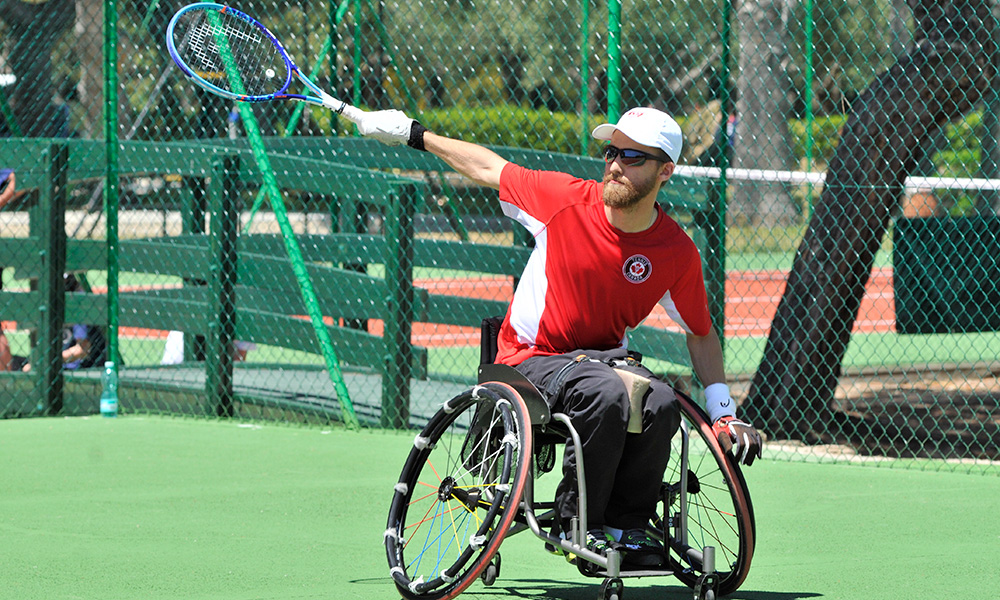
Dr. Rob Shaw, one of Canada’s top wheelchair tennis players, is UBC Okanagan’s 2022 recipient of the Governor General Gold Medal.
Some might think it’s a bit ironic that the winner of UBC Okanagan’s Governor General Gold Medal is already a gold-medal-winning athlete.
But Dr. Rob Shaw, who graduates this week with his Doctor of Philosophy in Interdisciplinary Studies, can quickly explain how much hard work goes into earning an honour of this calibre. Dr. Shaw is a wheelchair tennis player who won a gold medal at the 2019 Parapan American Games in Peru. He is the highest-ranked member of the Canadian wheelchair tennis team and last summer he competed in the Tokyo 2020 Paralympics.
He didn’t get there without a lot of hard work. The same could be said of his accomplishment at UBCO.
Dr. Shaw is the highest-ranked graduate student at UBCO, an honour that has earned him the Governor General’s gold medal.
“Looking at past winners I can’t help but feel humbled by this award,” he says. “Five years ago, my supervisor and I committed to completing a PhD that would make an impact beyond the silos of academia and extend into the community to benefit people living with spinal cord injuries. I’d like to think that this award reflects that we achieved that goal.”
While earning his doctoral degree, his research focused on how peer mentorship can improve the health and wellbeing of people who have incurred a spinal cord injury. While his supervising professor Dr. Kathleen Martin Ginis describes his research as exemplary, she notes he has also become an internationally respected scientist and a community leader.
Throughout his degree, Dr. Martin Ginis says he has embraced an interdisciplinary spirit, but his impact extends beyond the traditional walls of academia and into the community. His leadership and expertise are frequently sought out by local, national and international organizations, and he has an unwavering commitment to examining and resolving pressing societal issues.
“An excellent scientist can produce a lot of great research. But an excellent scientific leader finds the potential in people and has the courage to inspire and support them. Rob has achieved excellence and acclaim as both a scientist and scientific leader,” she adds. “Through his research and leadership, and his outstanding global citizenship, Rob is making the world a better place.”
Dr. Shaw, however, says this award is only possible thanks to the support from Dr. Martin Ginis and others he has worked with along his doctoral journey.
“I am extremely proud of the work we have been able to accomplish, and I owe this award to her, my lab mates, my community partners, and most importantly to my participants who allowed me into their world so that I could try to make a real difference in their lives.”
Dr. Shaw has been described by Dr. Martin Ginis as an outspoken champion of equity, diversity and inclusion.
“He consistently reminds and challenges all of us to think about inclusion and accessibility in how we conduct and share our research with others.”
The importance of inclusion is also reflected in both the name and the criteria of the Lieutenant Governor’s Medal for Inclusion, Democracy and Reconciliation. This week it will be presented to UBC Okanagan student Azzah Al Zahra Farras, who just completed her Bachelor of Arts with a joint major in philosophy, political science and economics.
Shortly after arriving at UBCO in 2018, Farras established a campus-wide chapter of Amnesty International and began hosting conferences and events to examine local and international issues. She coordinated weekly sessions where students could discuss international injustices, while creating a safe space for marginalized students to share their stories and discuss opportunities for students to engage in change.
“Through the Amnesty International chapter, we created opportunities for students on campus to share issues about human rights, protection, justice and conflicts that they care about from their own country,” says Farras, explaining the students had engaging conversations about many issues including the farmer’s protest in India, Tibetan rights to self-determination, the Palestinian rights, and democratic rights for people living in Thailand.
“I am surrounded by a very international community at UBCO and it’s something we should all look forward to in universities,” she adds. “I have a lot of friends from different countries that support me and also celebrate my culture and my beliefs and values as I celebrate theirs. That’s what I’m really happy about.”
In September 2021, she joined the UBC Okanagan Library team as a student representative of the UBC’s Inclusion Action Plan and Indigenous Strategic Plan, where she independently developed projects to highlight Arab, Muslim, Asian, Indigenous and Black voices in literature and academia. Farras built multiple book displays at the library and designed digital LibGuide sites that list resources based on each theme, granting students information and access regardless of their location during COVID-19.
Farras recalls the day when a student approached the service desk and tearfully thanked the library staff saying how encouraging it was to see students with hijabs represented at the library and it helped make her feel included.
“For me, this was a full-circle moment,” says Farras. “Although I did feel isolated in my first year, I was able to change that situation for younger hijab-wearing students. I believe these efforts transpired important representation at UBCO. It raises important conversations on institutionalized racism and discrimination against marginalized groups. I am honoured to be a part of that shift.”
UBCO Librarian Christian Isbister says Farras worked tirelessly to engage the campus community and bring awareness to diverse voices in the library collection. Her book displays were always popular and well-received, and her work on the Book Fairies project helped encourage reading of more diverse authors, including Indigenous, Black, Asian and Arab writers.
“Azzah has dedicated herself to the promotion of inclusion on our campus,” says Isbister. “At the library, she demonstrated great leadership in developing initiatives to highlight diverse voices in our collection, and foster a sense of welcome and belonging for students belonging to marginalized communities. It was a pleasure to get to work with Azzah, and her presence in the library will be greatly missed.”
Also, this week, Anna Bernath, who just completed her Bachelor of Science degree with concentrations in biochemistry and molecular biology, was awarded the Pushor Mitchell Gold Medal Leadership Prize.
The $10,000 prize is the largest donor-funded award available to graduating Irving K. Barber Faculty of Science students. The award recognizes a student who has excelled academically and demonstrated leadership while earning their degree.
Bernath joined Dr. Andis Klegeris’ Cellular and Molecular Pharmacology Lab as a volunteer research assistant, and contributed upwards of 250 hours in the facility. She also conducted research studying the role of microglia—immune cells of the brain—in Alzheimer’s disease. When not in the lab or studying, she worked as a teaching assistant, acting as a liaison between faculty and students.
“I have immense gratitude for the faculty, staff and UBCO colleagues who created invaluable opportunities for growth and leadership, and I hope I made a lasting impact on junior students and excited them about research endeavours,” says Bernath.
The Pushor Mitchell LLP Gold Medal Leadership Award has been presented to a student at UBCO since 2009, explains Andrew Brunton, Managing Partner at Pushor Mitchell.
“Pushor Mitchell is very pleased to see another deserving student receive this award,” says Brunton. “Our firm has been supporting this prestigious award at UBC Okanagan for 13 years now, presented to students based on both academic excellence and community leadership. We applaud this year’s recipient Anna Bernath and wish her luck with her career in neuroscience research.”
Farras and Bernath will be recognized as they cross the stage at Thursday’s convocation while Dr. Shaw will receive his medal Friday morning.
Other University of British Columbia medal (top of class) winners are:
The post Gold-medal tennis player, human rights activist win UBCO honours appeared first on UBC Okanagan News.
Posted in Uncategorized
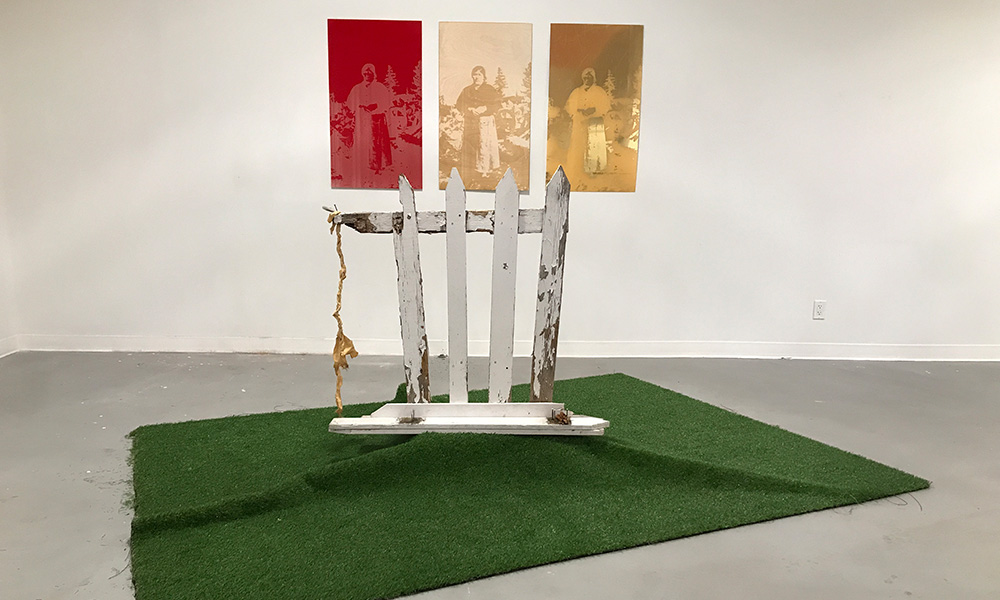
Artist Manual Axel Strain uses a variety of materials and methods including plywood, spray paint, a metal and video to create an immersive and multisensory installation. The above 2021 image is called qné7e says tá7a.
Posted in Uncategorized